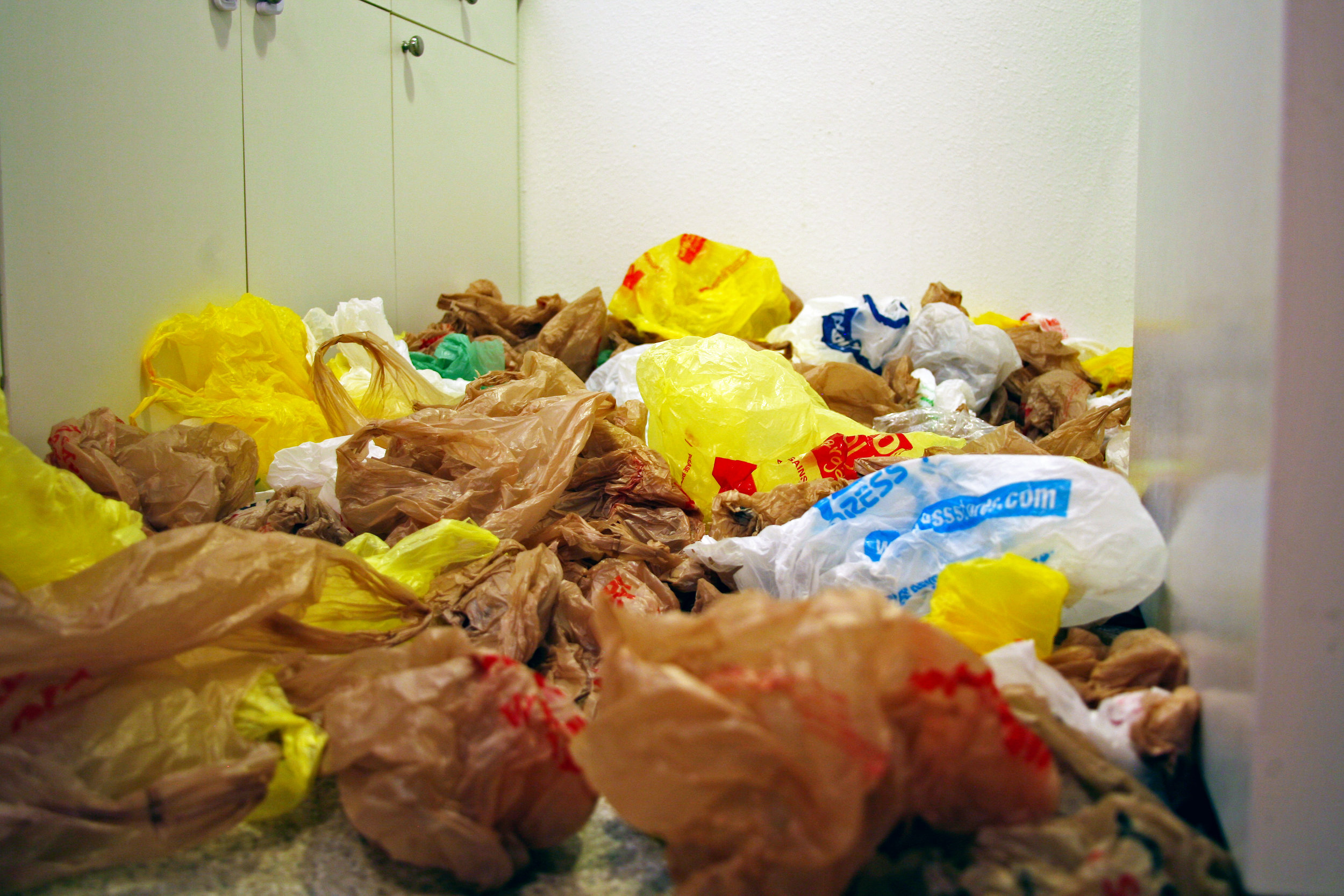Disposable Culture
I read a lengthy but insightful post from a member in a facebook group where people share stories about ways they are cutting down on waste in their lives, helping each other find tricks to make it easier. This post referenced our “disposable culture” and it really got me thinking about the drive for over-consumption that is present throughout our daily lives and how it causes a very real rift in the value of our connections with one another. The use-and-throw-away experience we repeat with every object we encounter has created a discardable sense to everything we do.
A bag containing one year's worth of my plastic bags.
One of the main things I appreciate about living in Ellensburg is the way our town represents strength in community. In many ways it is easier to live here than other places; from the accessibility of the layout and community size, variety that downtown and CWU campus offer, willingness to assist and treat others with kindness that nearly everyone here possesses, and the close-knit way everyone comes together to help those in need. It came as a shock to me how many people threw tantrums like oversized toddlers in reaction to a bag ordinance encouraging consumers to find a more sustainable way to take away their groceries. Rather than shut people out who don’t see right and wrong the same way I do, I sought to really understand why people are having this reaction. There is one obvious reason; changing habits is hard. This is precisely why a program like charging five cents per plastic bag is effective, because monetary incentives are persuasive. But some of the things going on in people’s heads have deeper roots than that.
The lack of transparency that enables large for-profit businesses to increase revenue through channels that compromise the greater good is the largest culprit. We throw garbage away and it is gone. We (maybe) recycle our plastic grocery bags in the bin at the store and they are gone. The public lacks general knowledge of what happens to waste, the amount of energy used to recycle, which items are even recyclable, and what will happen if we don’t work to fix the very real problem our planet is facing. There are no demands for quality over disposability and we are not holding companies responsible for manufacturing items in an ethical way. Spoiler alert: it’s more expensive for them to worry about sustainability, so they won’t do it unless we make them.
How many plastic bags did your family acquire last year?
I saved up one year’s worth of my plastic bags. What you see pictured is less than the average American family, who takes home 1500 plastic bags per year. Plastic bags are used for an average of 12 minutes, and then 1% of them are recycled, with the other 99% going to the landfill or littering the ocean. It takes 500 or more years for a plastic bag to degrade, and it will never degrade completely since it turns into microplastic which absorb toxins and pollute the environment. This is not ok.
I am making real changes this year. I have not accepted a single plastic grocery bag. I have still purchased some items packaged in plastic and used plastic bags for bulk items, but I will be cutting those out too. I wanted to weave my plastic bags into reusable bags and was trying to figure out a way to do so when I saw a video that made plastic fusing look easy. I gave it a try and it’s not (thanks DIY fairies) so I think I’m giving myself permission to recycle my year’s supply of bags! I am working on some bag designs that reflect our local community values in the hopes that I can get some in the hands of the people who don’t want to pay the five cent fee. Here’s a test bag I painted the night I was so disappointed about not being able to fuse my plastic bags into reusable bags. The design needs some work but I’m excited to get other people on board with fixing our disposable culture and putting value in ourselves, our objects, and our planet back in style.
DIY produce bag is a work in progress. I'm also working on designs for full sized bags and bulk bags too!
While these steps are only one small part of changing the overall crisis picture, it’s something simple we can all do. Did you know glass is infinitely recyclable? Use glass containers. Reduce the amount you bring into your home. Reuse the crap out of them and then recycle them. Don’t be tempted to throw them away - It takes over 1 million years for a glass bottle to decompose! Humans are not vampires, we don’t have time to wait out that kind of thing. And for the love of god, please stop buying fruits and vegetables wrapped in plastic. We have an amazing farmer’s market here - go to it!
All photos featured on this blog are copyrighted images. © January Bear Photography, 2018



